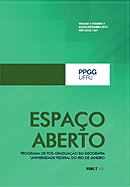Small-Scale Farming Resilience in the Metropolitan Countryside of Rio de Janeiro
DOI:
https://doi.org/10.36403/espacoaberto.2021.46880Keywords:
Farming Resilience, Small-scale Farming, Rural Change, Rural-urban Interface, Rio de Janeiro Metropolitan RegionAbstract
This article discusses how different degrees of rural-urban interaction in the Metropolitan Region of Rio de Janeiro give rise to multifunctional diversity, farming resilience, and rural innovation. In some rural areas, specialized agriculture supplies products to the metropolitan area so taking advantage of accessible markets in a classic way. At the same time, agricultural and non-agricultural activities are combined in creative ways in other areas, which defy the linear logic of rural change. The complexity of farming systems in this urban-industrial region contributes to better understanding the rural hinterland, going beyond the view that it is an inert space only subject to external interferences and actions. To achieve this, the research examined the pressures facing farmers in areas affected by urban and industrial dynamics of Rio de Janeiro, how these pressures have influenced farming systems, how farmers have developed individual and collective resilience, and the wider theoretical and policy lessons gained from how rural areas and farming communities respond to urbanisation. The study argues that rural space should also be seen to possess its own dynamics and resilience that contribute to complex outcomes in which the leadership of social actors creates forms of spatial ordering through which they adapt to scenarios of regional change.


